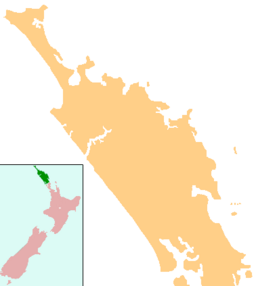Lake Kihona facts for kids
Quick facts for kids Lake Kihona |
|
|---|---|
| Location | Northland Region, North Island |
| Coordinates | 34°37′48″S 172°54′24″E / 34.6300°S 172.9067°E |
| Type | dune lake |
| Primary outflows | Pukekura Stream |
| Basin countries | New Zealand |
| Surface area | 7.8 hectares (19 acres) |
| Max. depth | 8.3 metres (27 ft) |
Lake Kihona is a special type of lake found in the Northland Region of New Zealand. It's known as a dune lake because of how it was formed. You can find it to the northwest of a place called Te Kao, on the Aupouri Peninsula.
What is a Dune Lake?
A dune lake is a lake that forms in the hollows between sand dunes. Imagine big piles of sand (dunes) that block off a valley or gully. Over time, water collects in that blocked-off area, creating a lake. Lake Kihona was made exactly this way, with sand dunes to its west acting like a natural dam.
How Water Flows In and Out
Lake Kihona has water flowing into it from a small stream on its northeastern side. This is called an inflow stream. The lake also has water flowing out of it, which is called an outflow. The water from Lake Kihona leaves through a stream called Pukekura Stream. This stream carries the water all the way to Ninety Mile Beach on the west coast.
What's Around Lake Kihona?
The area around Lake Kihona is mostly covered by pine forests. This whole area, where rain collects and flows into the lake, is called the catchment. On the northern side of the lake, there's also a natural buffer of manuka scrub. Manuka is a type of native New Zealand plant. This scrub helps protect the lake by filtering water and providing habitat for local wildlife.


